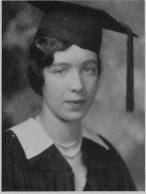Abstract
Mary Bernadette Banigan begins her interview by discussing her family background, her experience at Classical High School, and her reasons for attending Pembroke College. Throughout Part 1, she describes her favorite professors, and postgraduate options for an English major at Pembroke. She ends the section by explaining her time at Chapel and her extracurricular interests, particularly her intense involvement with Varsity Debating.
In Part 2, Banigan elaborates on her non-academic activities, including playing basketball, fistball, the physical education requirement, and what sort of costume was appropriate for such activities. She also explains her life as a “city girl,” before discussing her training as a teacher, the effect of the Great Depression, and her impressions of United States’ President Franklin Delano Roosevelt.
In Part 3, Banigan discusses her opinion of the Brown/Pembroke merger. She recalls gender inequalities that women faced in the workplace and shares advice for the women of today, especially those seeking to be teachers.
Part 1
Part 2
Part 3
Recorded on November 29, 1982 in Providence, RI
Interviewed by Jennifer Levine
Suggested Chicago style citation: Banigan, Mary Bernadette. Interview. By Jennifer Levine. Pembroke Center Oral History Project, Brown University. November 29, 1982.
Biography
Mary Bernadette Banigan was born in Pawtucket, Rhode Island in 1910. Banigan attended Classical High School before graduating with an A.B. in English from Brown University in 1931. After college, she worked for forty-five years as a teacher and curriculum researcher at Oliver Hazard Perry Middle School, and Rhode Island Association of the Blind. She returned to Classical High School to teach, retiring in 1979. In addition to her career as an educator and researcher, Banigan was the former recording secretary of American Association of University Women. She was a member of the Providence Federation of Teachers, the Rhode Island Council of Teachers of English, the Brown Alumni Association, and the Rhode Island Historical Society. Banigan died on April 7, 2002 in North Providence, Rhode
